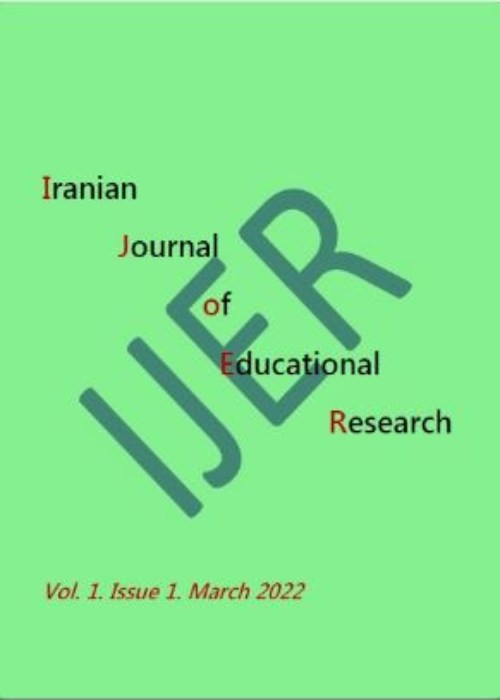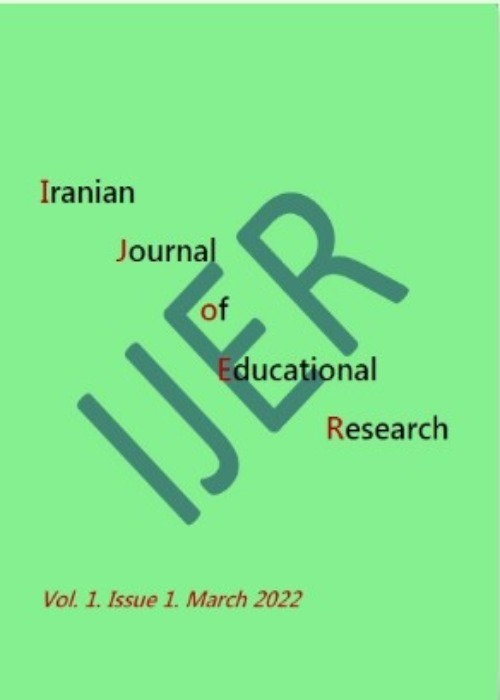فهرست مطالب

Iranian Journal of Educational Research
Volume:2 Issue: 1, Winter 2023
- تاریخ انتشار: 1401/12/10
- تعداد عناوین: 6
-
-
Pages 1-11
The purpose of this research was to predict learned helplessness based on academic resilience and test anxiety among students with academic failure. The present research method was descriptive-correlation. The statistical population of this research included all the students with academic failure in the second year high schools in Bandar Abbas (Iran). The sample was selected by a multi-stage cluster method. In order to collect data, Learned Helplessness Scale (Quinless & McDermott-Nelson, 1988), Samuels's Academic Resilience Scale and the FRIEDBEN Test Anxiety Scale (Friedman & Bendas-Jacob, 1997) were used. The data were analyzed using multiple regression analysis in the SPSS-26 software. The results indicated that academic resilience (β=-.47) and test anxiety (β=.21) predict learned helplessness significantly (P<.05). Also, R2 showed that 32% of the changes in the criterion variable are explained by the predictor variables. In a general conclusion, it can be said that in order to decrease the level of learned helplessness of students with academic failure, its recommended to increase resiliency and control the test anxiety in them.
Keywords: learned helplessness, academic resilience, test anxiety, students with academic failure -
Pages 12-19
This research delves into the intricate relationship among academic accomplishment, family functions, and academic perfectionism in a cohort of 154 university students enrolled at the University of Hormozgan in 2022. Employing regression analysis, the study seeks to elucidate the interconnections among these variables. Academic perfectionism, characterized by the pursuit of flawlessness and the imposition of high self-set standards, often exerts a significant impact on students' educational journeys. The study's objective is to probe how academic achievement and family functioning synergistically contribute to the emergence of academic perfectionism. The participants underwent assessments utilizing validated tools to gauge academic perfectionism, academic achievement, and family functions. The analysis of data encompassed regression analysis to unveil the intricate links between the variables. The outcomes offer valuable insights into the potential indicators of academic perfectionism among college students. By concurrently exploring the influences of academic accomplishment and family dynamics, this study adds to a comprehensive comprehension of the factors shaping academic perfectionism. The implications of these findings are poised to guide educators, counselors, and educational institutions in cultivating more nurturing academic atmospheres and aiding students in managing the trials associated with tendencies toward perfectionism.
Keywords: academic accomplishment, family functions, academic perfectionism, college students -
Pages 20-28
The aim of this study is to compare experiential avoidance, resilience, and emotional regulation difficulties in adolescent students with narcissistic and histrionic personality traits. The research is descriptive and of a comparative nature. The study population consists of adolescents seeking counseling and psychotherapy services affiliated with the Welfare Organization in Regions 10, 11, and 12 of Tehran. Among the individuals seeking assistance, a total of 100 participants (50 with narcissistic traits and 50 with histrionic traits) were selected using convenience sampling as the research sample. The research instruments included standardized questionnaires for acceptance and action, resilience, and emotional regulation difficulties. Multivariate analysis of variance (MANOVA) was employed for data analysis. The findings indicated a significant difference in experiential avoidance, resilience, and emotional regulation difficulties among adolescents with narcissistic and histrionic personality traits (P < 0.01). The results showed that the levels of experiential avoidance were higher among individuals with narcissistic personality traits, while the average scores of resilience and emotional regulation difficulties were higher among individuals with histrionic personality traits.
Keywords: Experiential avoidance, resilience, emotional regulation difficulties, histrionic personality, narcissistic personality, students -
Pages 29-38
This study aims to examine the relationship between COVID-19 anxiety and psychological distress among adolescent female students in Region 6 of Tabriz. The research follows a correlational design, and the population includes all students in Region 6 of Tabriz, totaling 1840 individuals. A sample of 150 participants was selected using convenience sampling (due to the COVID-19 pandemic) based on the nature of the research. Participants completed the psychological distress questionnaire by Kessler and colleagues (2002) and the COVID-19 anxiety questionnaire. Notably, due to the pandemic, the questionnaires were completed through virtual platforms (Telegram, Instagram, and email). Data analysis was performed using stepwise regression analysis to analyze the findings. Assumptions related to data parametricity, including homogeneity of variances and normal distribution, were examined. The results revealed a significant positive relationship between COVID-19 anxiety and psychological distress. This study sheds light on the impact of COVID-19 anxiety on the psychological well-being of adolescent female high school students.
Keywords: Covid-19 anxiety, psychological distress, high school students -
Pages 39-49
The concept of time and its scheduling may have ancient roots in human history. This research aims to examine the relationship between time perspective and insufficient self-discipline among postgraduate students of Mashhad University of Medical Sciences. This study utilizes a correlational research method. The statistical population comprises all postgraduate students of Mashhad University of Medical Sciences in 2022, and the research sample consists of 97 individuals selected through convenience sampling. The research tools include the "Time Perspective Scale," "General Health Questionnaire (GHQ)," and "Short-form Dysfunctional Attitude Scale" by Young. The data are analyzed using SPSS-26 software. Descriptive statistics (frequency, mean, and standard deviation) are employed for data analysis. In the inferential statistics section, Pearson correlation coefficient and regression analysis are used. The results of the study indicate a significant correlation between time perspective and insufficient self-discipline. Considering the findings of this research, counseling centers, addiction rehabilitation centers, educational institutions, universities, and other organizations can utilize the results to enhance efficiency and effectiveness across all domains for beneficiaries and clients.
Keywords: Time perspective, insufficient self-discipline, postgraduate students -
Pages 50-58
Marital issues and depression commonly manifest within couples, displaying a reciprocal connection. This research aimed to assess the impact of group-based dialectical behavior therapy on enhancing emotional, communicative, sexual, and social-recreational intimacy among couples experiencing depression. Conducted as an experimental study with both experimental and control groups, the research involved 20 couples seeking assistance at counseling centers in Shahrekord (Iran) due to depression. The couples were selected through purposive sampling and then randomly assigned to either the experimental or control group. Utilizing a marital intimacy questionnaire, baseline measurements of marital intimacy were taken for both groups prior to the intervention (pre-test). Following an 11-week intervention comprising 90-minute sessions for the experimental group, post-intervention assessments were conducted for both groups using the same questionnaire (post-test). The data underwent analysis involving descriptive statistics and Multivariate Covariance method. The results indicated that dialectical behavior therapy yielded significant enhancements in emotional, communicative, sexual, and social-recreational intimacy for depressed couples within the experimental group, compared to the control group (P<0.05). The study underscores the meaningful implications of exploring the efficacy of dialectical behavior therapy on various dimensions of intimacy for couples experiencing depression, offering valuable insights into the mental well-being of such couples.
Keywords: Dialectical behavior therapy, Intimacy, emotional, communicative, sexual, social-recreational, depression, couples


